How Addiction Impacts Decision-Making Skills

Introduction: Understanding Addiction and Cognitive Functioning
Addiction is a complex condition marked by compulsive engagement with rewarding stimuli despite adverse consequences. It significantly impacts various aspects of cognitive functioning, particularly decision-making. This article delves into how addiction affects decision-making skills, exploring the underlying mechanisms, cognitive impairments, and potential interventions. We aim to provide a comprehensive understanding of how addiction rewires the brain, influencing choices that are often detrimental to one's well-being.
Neural Mechanisms Underlying Decision-Making in Addiction
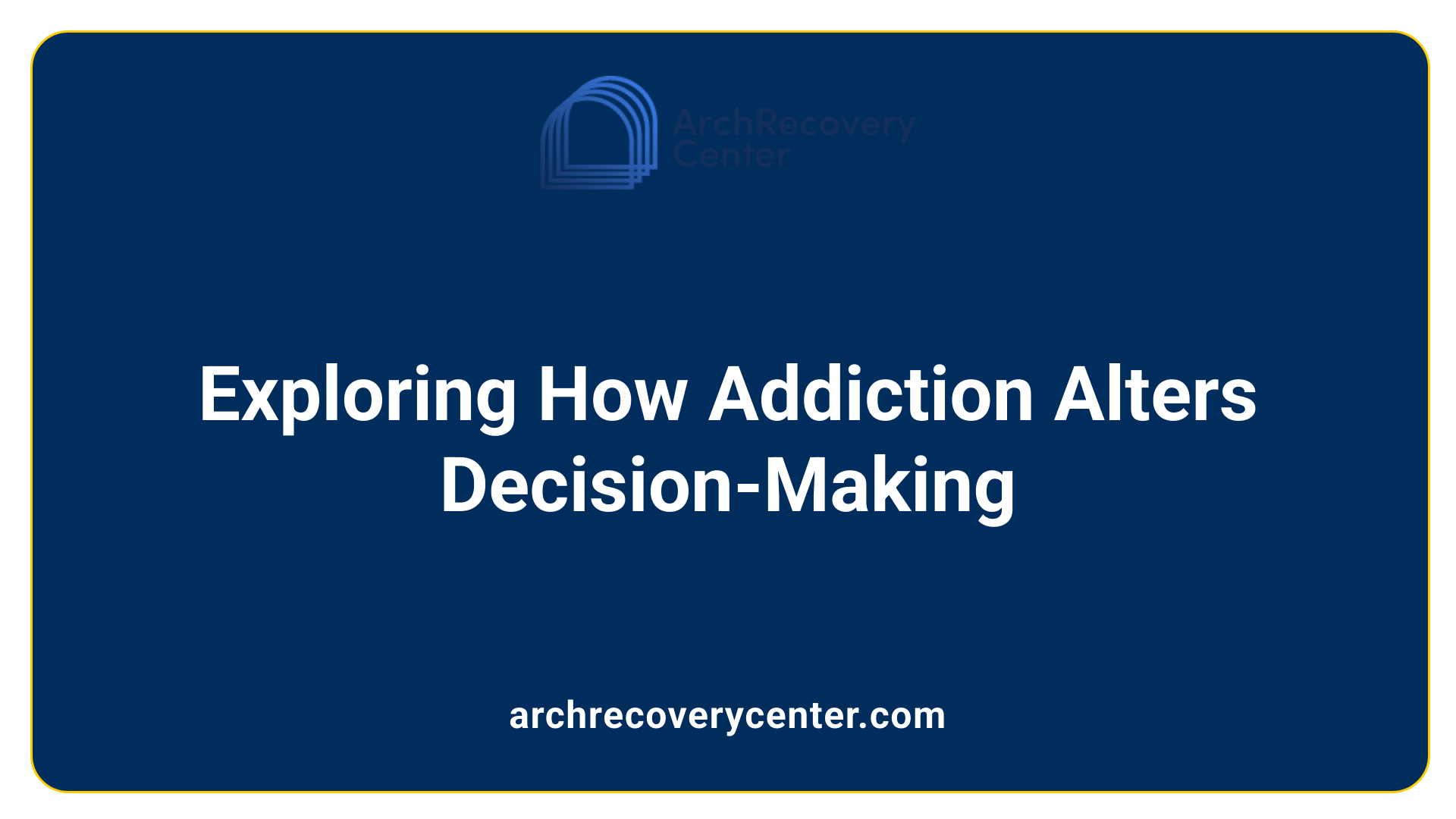
How does addiction affect a person's decision-making?
Addiction profoundly impacts the brain's decision-making capabilities. Changes to critical areas, such as the prefrontal cortex and the amygdala, disrupt rational thought and organization of emotions. These alterations lead to impulsive behaviors and a lack of foresight regarding the consequences of one's actions.
When individuals develop a dependency on substances, there’s a significant alteration in neurotransmitter systems as well. Dopamine, a neurotransmitter associated with pleasure and reward, is released in much larger quantities during substance use than during natural rewards. This leads to a heightened desire for these substances over healthy alternatives, resulting in impaired decision-making due to the brain's reorganization to prioritize drug-seeking behavior.
The Role of Neurotransmitters in Altered Decision-Making
Imbalances in neurotransmitters like serotonin and dopamine contribute substantially to the decision-making deficits observed in those with addiction.
- Dopamine: Increased sensitivity to immediate rewards diminishes the temporary satisfaction that other natural rewards once provided, skewing decisions toward instant gratification.
- Serotonin: Low serotonin levels correlate with impulsivity, leading individuals to make rash decisions without weighing the negative outcomes.
This combination of neurobiological changes creates a cycle where addiction perpetuates dysfunctional decision-making. As a result, individuals often find themselves entrenched in addictive behaviors, neglecting their long-term interests in favor of immediate fulfillment, and struggling against a backdrop of stigma and treatment barriers.
Cognitive Impairments in Addiction: Memory, Learning, and Control
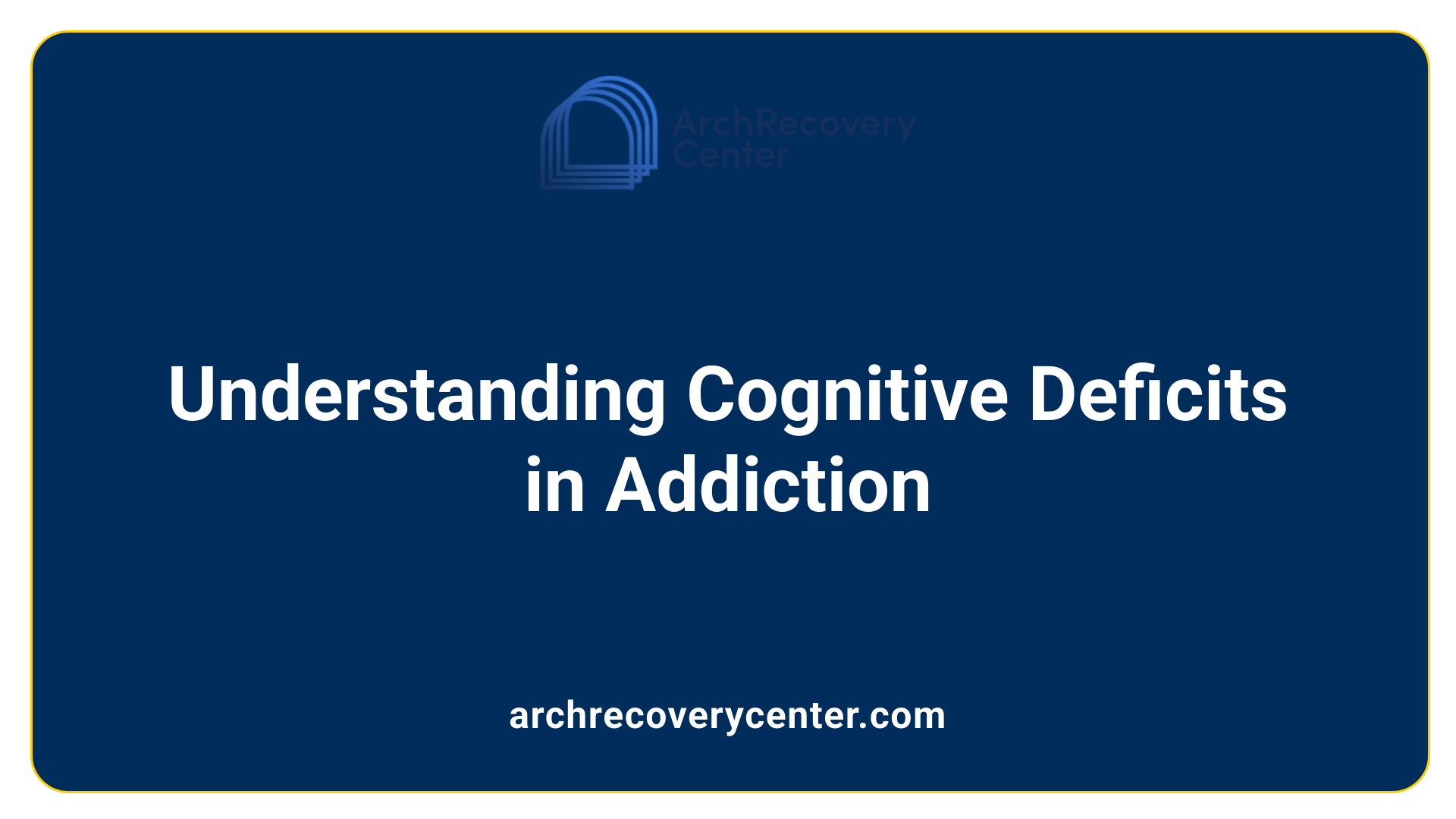
How does addiction affect cognitive function?
Addiction significantly impairs cognitive function, affecting areas such as learning, memory, decision-making, and behavioral control. This decline complicates recovery efforts and increases the risk of relapse. For example, individuals addicted to psychostimulants, such as cocaine and methamphetamine, demonstrate marked deficits in cognitive flexibility and working memory.
Specific cognitive functions impaired by addiction
The cognitive impairments primarily include:
- Decision-Making: Substances disrupt the brain's ability to assess risks versus rewards, leading to impulsive choices. Individuals may prioritize immediate gratification over long-term wellbeing.
- Memory: Substance abuse can lead to forgetfulness and difficulties in forming new memories, severely impacting the capacity to learn from past experiences. This is particularly true for users of alcohol and stimulants.
- Learning Processes: Learning from punishments is less effective in those with substance use disorders, which can hinder their ability to change behavior based on negative outcomes.
These cognitive deficits not only affect the decision-making process but also reinforce addictive behaviors, as they may lead to poor judgments regarding substance use.
Impact on memory and learning processes
Emotional dysregulation from addiction further exacerbates cognitive impairments, as mood swings and impulsive reactions interfere with rational thought. Addressing these cognitive and emotional deficits through both pharmacological and non-pharmacological interventions is crucial for improving treatment outcomes.
By focusing on cognitive rehabilitation, individuals can work towards rebuilding memory and learning capabilities, significantly enhancing their prospects for recovery and social integration.
From Preferences to Feedback: Stages of Dysfunctional Decision-Making in Addiction
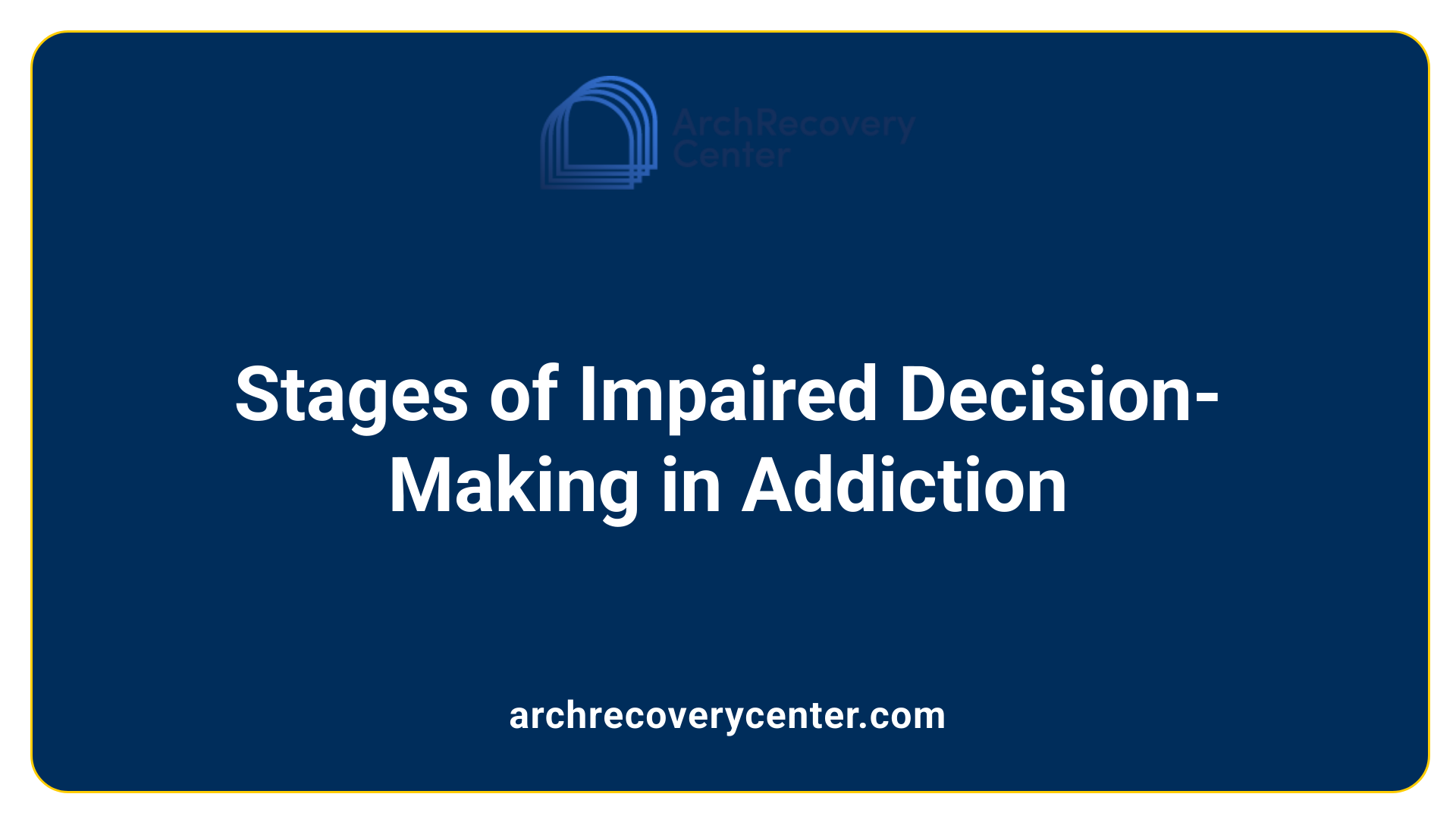
What are the stages of dysfunctional decision-making in addiction?
Cognitive dysfunction in addiction can be mapped into three stages: the formation of preferences involving the valuation of decision options; choice implementation, including motivation, self-regulation, and inhibitory processes; and feedback processing, which involves reinforcement learning. Each of these stages impacts how individuals with substance use disorders (SUDs) make decisions.
Stages of Decision-Making Affected by Addiction
- Preference Formation: In this phase, individuals with SUDs often place a higher value on risky options that promise immediate rewards, reflecting a distorted assessment of risk versus reward.
- Choice Implementation: This involves the motivation to act on a chosen option. Those suffering from addiction frequently exhibit lower cognitive control and impulsivity, leading to riskier decision-making. They may prioritize immediate gratification over long-term goals during this stage.
- Feedback Processing: Feedback from previous choices plays a critical role in guiding future decisions. Individuals with SUDs tend to learn more from rewards than losses, indicating a significant bias in how they evaluate outcomes.
Consequences of Impaired Choice Implementation and Feedback Processing
The ramifications of impaired decision-making are severe. Poor choice implementation results in a heightened likelihood of engaging in impulsive and risky behaviors, while ineffective feedback processing hampers the ability to learn from mistakes. Over time, this cycle perpetuates harmful behaviors, making it challenging for individuals to break free from addiction and maintain recovery.
Impact of Substance Use on Emotional Processing and Decision-Making
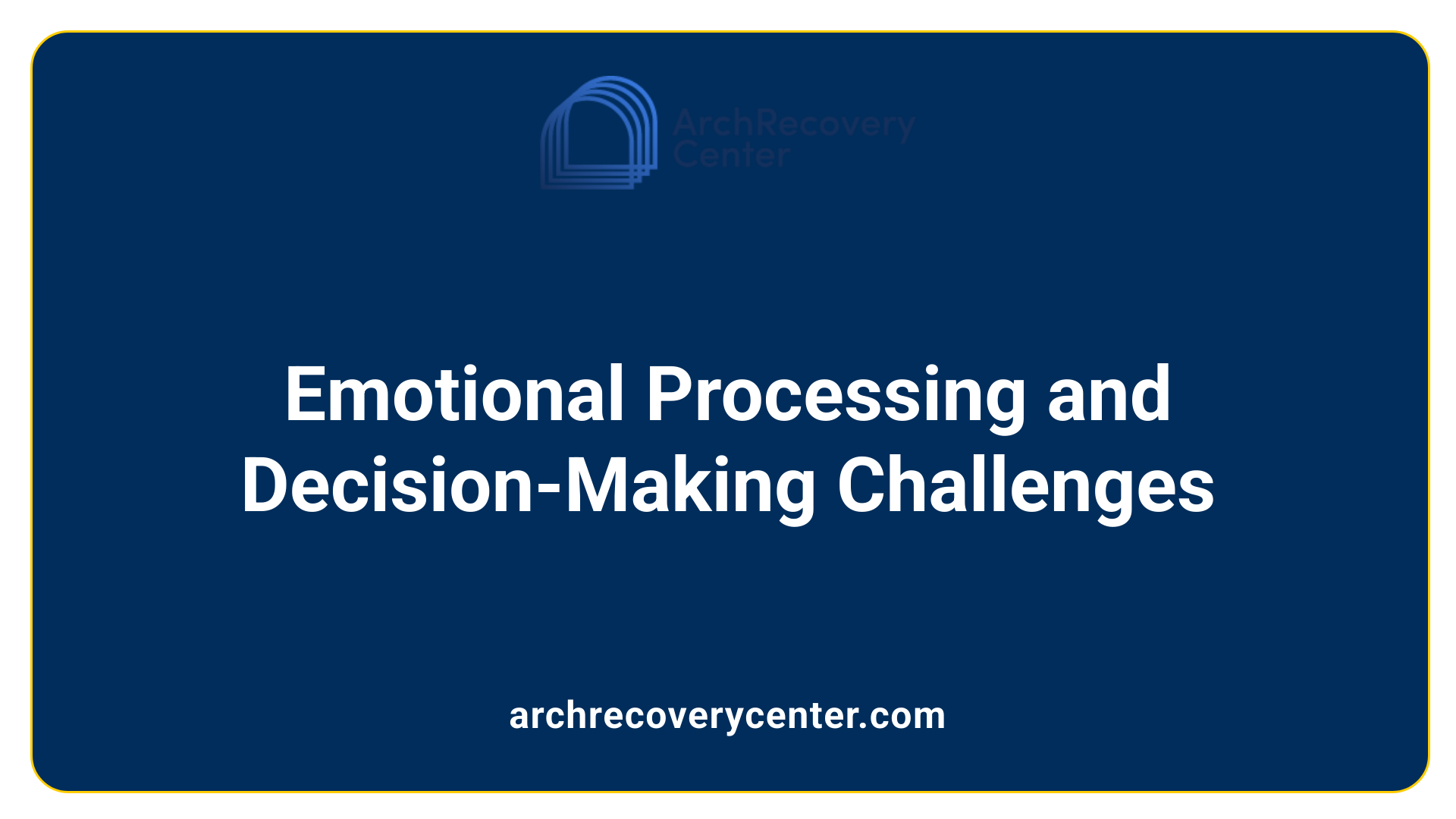
Role of emotional processing in decision-making
Emotional processing plays a crucial role in how decisions are made, particularly under the influence of addictive substances. The somatic marker hypothesis posits that emotions guide our decisions by creating a physiological response to anticipated outcomes. However, substance-dependent individuals (SDIs) often show impaired emotional processing, which in turn disrupts effective decision-making.
In addiction, significant brain regions involved in emotional regulation—such as the ventromedial cortex, amygdala, and anterior cingulate cortex—are compromised. This impairment leads to a flawed assessment of risks versus rewards, as SDIs may prioritize immediate gratification despite the long-term consequences. Consequently, decisions are often made impulsively, reflecting a preference for immediate rewards over appropriate evaluations of negative outcomes.
Effects of substance use on emotional and cognitive regulation
Substance use can significantly disrupt emotional and cognitive functions, making decision-making arduous. Users typically display a heightened sensitivity to immediate rewards while becoming less responsive to potential risks, a phenomenon linked to altered neurotransmitter systems like dopamine and serotonin. This imbalance heightens the risk-taking behavior common among those with substance use disorders (SUDs).
Research indicates that during decision-making tasks, SDIs show decreased ability to learn from negative feedback, often continuing down harmful paths despite realizing the associated risks. For instance, performance on the Iowa Gambling Task reveals significant challenges in forming beneficial preferences, as they often avoid reflecting on prior lessons.
The implications of these cognitive deficits extend beyond addiction, affecting overall life choices and long-term goals, underlining the pressing need for effective interventions.
| Aspect | Impact on Decision-Making | Example of Consequences |
|---|---|---|
| Impaired Emotional Processing | Failure to evaluate risks properly | Engagement in risky behaviors, e.g., driving under influence |
| Altered Neurotransmitter Levels | Exaggerated reward sensitivity | Continued substance use despite health risks |
| Cognitive Dysfunction | Poor learning from punishment | Difficulty quitting substances due to repeated behaviors |
How do stimulants affect decision-making?
Stimulants adversely affect decision-making by damaging the brain's decision-making abilities, particularly through impairments in the orbitofrontal cortex, which is linked to reasoning and impulse control. Research indicates that stimulant users often exhibit slower response times and increased impulsive and compulsive behaviors, leading to poor performance on decision-making tasks. These cognitive deficits grow more severe with longer periods of stimulant use, complicating efforts to quit due to heightened challenges in managing addiction. Additionally, the impulsivity trait may be exacerbated in chronic users, suggesting a genetic predisposition that complicates their decision-making further. Overall, the interplay between stimulant use and decision-making illustrates a detrimental cycle that can significantly hinder recovery efforts.
Immediate vs. Long-Term Consequences: The Decision-Making Dilemma in Addiction
Risk-taking Behaviors in Addiction
Individuals struggling with addiction often engage in high-risk behaviors due to impaired decision-making abilities. The decision-making dysfunction associated with substance use disorders (SUD) leads to a greater likelihood of prioritizing short-term gains over potential long-term harms. For instance, users may overlook severe consequences like legal repercussions, health deterioration, or personal relationships while opting for immediate gratification, such as substance use.
Preference for Immediate Rewards Over Long-Term Benefits
This tendency to favor immediate rewards is a hallmark of addiction. Research demonstrates that those with substance use disorders frequently exhibit increased sensitivity to rewards and diminished sensitivity to potential negative outcomes. They may find themselves caught in a cycle of impulsivity, unable to heed past experiences that should inform more cautious decision-making.
Impacts on Decision-Making
| Impairment Aspects | Immediate Rewards | Long-Term Consequences |
|---|---|---|
| Sensitivity | Exaggerated, leading to risky behavior | Undervalued, frequently ignored |
| Emotional Processing | Compromised, affecting rational thought | Neglected, reduces foresight |
| Risk Assessment | Poor, favors impulsivity | Weak, leads to poor choices |
Such decision-making challenges signify a critical aspect of addiction, revealing how deeply intertwined cravings and choices are when weighed against long-term wellbeing.
Interventions to Enhance Decision-Making in Addiction Recovery
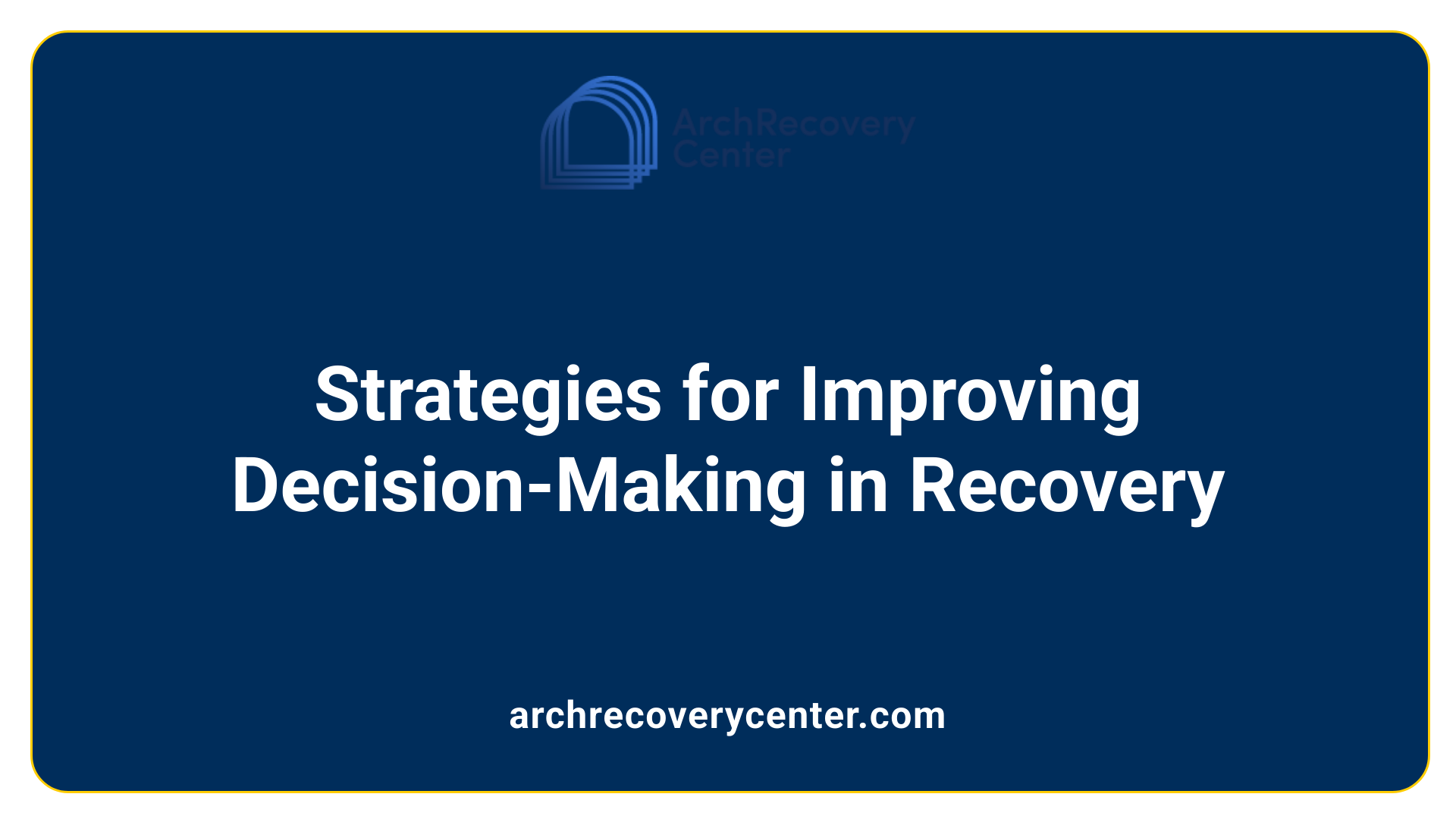
Strategies to Improve Cognitive Function in Recovery
Enhancing decision-making skills during addiction recovery involves several strategies aimed at restoring cognitive functions. These may include:
- Cognitive exercises: Engaging in brain-training activities that challenge memory and decision-making capabilities.
- Mindfulness practices: Techniques like meditation can help improve emotional regulation and reduce impulsivity, aiding in sound decision-making.
- Nutrition and physical health: A balanced diet and regular physical activity can enhance overall brain health and support better cognitive functioning.
Role of Therapy in Rebuilding Decision-Making Skills
Therapeutic interventions play a pivotal role in improving decision-making processes in individuals recovering from addiction. Notable therapies include:
- Cognitive-Behavioral Therapy (CBT): This approach helps individuals identify and change harmful thought patterns, making it easier to weigh the consequences of their choices.
- Dialectical Behavior Therapy (DBT): Focusing on emotional regulation and interpersonal effectiveness, DBT aids individuals in making decisions aligned with their long-term goals.
- Support groups: Sharing experiences and coping strategies in group settings fosters accountability and strengthens decision-making skills through collective learning.
By concentrating on cognitive improvement and engaging in supportive therapies, individuals can develop healthier decision-making habits during recovery, ultimately facilitating their long-term sobriety.
Case Studies and Real-World Implications of Impaired Decision-Making
Examples of Impaired Judgment Due to Addiction
Addiction not only alters brain chemistry but also severely impacts decision-making abilities. A poignant example is Michael Puncheon, whose addiction began at the age of seventeen. In an incident while under the influence of drugs, he engaged in dangerous driving to evade police, showcasing a severe lapse in judgment that reflects typical behaviors linked to substance use disorders (SUDs). This case illustrates how addiction diminishes the capability to evaluate risks and outcomes, prompting reckless choices that may have life-threatening consequences.
Legal and Personal Consequences
The legal ramifications of impaired decision-making due to addiction can be significant. Puncheon faced penalties such as a driving ban and community service, which highlight the external consequences of poor choices made while intoxicated. Furthermore, individuals in recovery often find that addicted behaviors strain personal relationships, leading to isolation and conflict with loved ones. The inability to think rationally contributes to a cycle of regret, where immediate gratification takes precedence over long-term well-being, reinforcing their dependency.
In summary, the cognitive deficits prompted by addiction extend into various life aspects, underscoring the urgent need for effective interventions and supporting systems to address the decision-making impairments associated with substance use.
Conclusion: Moving Forward with Better Understanding and Care
Understanding the profound impact of addiction on decision-making is crucial for developing effective treatment strategies and supportive environments for individuals in recovery. By integrating insights into both the neural and behavioral implications of addiction, we can foster more compassionate and evidence-based approaches to support those affected by this condition. Continued research, alongside patient-centered interventions, holds the promise of improving recovery outcomes and enabling individuals to regain control over their decision-making and lives.
References
- Emotion, Decision-Making and Substance Dependence: A Somatic ...
- What Causes Bad Decision Making in Addiction? | Austin, TX Rehab
- Stages of dysfunctional decision-making in addiction - ScienceDirect
- 10 Causes of Decision-Making Failures in Addiction
- How Decision-Making is Affected by Addiction | Recovery Lighthouse
- Cognition is central to drug addiction
- How Alcohol Can Impact Your Decision Making
- How Does Drug Addiction Impair Decision-Making Abilities?
Recent articles

Triumph in Recovery from Prescription Drugs in OKC
February 19, 2025
Discover the path to recovery from prescription drugs in OKC with support, programs, and inspirational stories.

Identifying Effective Addiction Treatment Centers
February 19, 2025
Explore the qualities of effective addiction treatment centers and find the right path to lasting wellness.

The Benefits of Rehabs in PA
February 19, 2025
Exploring Pennsylvania's Rehab Advantages

Secular Recovery Groups
February 19, 2025
Explore secular recovery groups: their effectiveness, benefits, and how to choose the right one for healing.

How to Redefine Your Connection with Alcohol
February 19, 2025
Discover how to redefine your connection with alcohol for a healthier, happier relationship. Find effective strategies and support for change.

Substance Use Abuse and Chemical Dependency
February 19, 2025
Overcome substance use abuse and chemical dependency to reclaim your life. Discover effective treatments for a brighter future.

Exploring Binge Drinking Statistics & Facts
February 19, 2025
Discover eye-opening binge drinking statistics & facts. Uncover the impact, contributing factors, and strategies for prevention.

The Importance of Establishing Healthy Routines During Rehab
February 19, 2025
Creating a Path to Recovery Through Structured Daily Life

How a Structured Schedule Helps You Heal During Residential Treatment
February 19, 2025
The Transformative Power of Routine in Residential Recovery

The Importance of Dual Diagnosis Treatment in Residential Rehab
February 19, 2025
Why Integrated Care for Dual Diagnosis Is Essential in Residential Rehabilitation

How Benzo Addiction Treatment Programs Reduce Cravings and Triggers
February 18, 2025
Effective Strategies to Alleviate Benzo Cravings and Triggers

How Alcohol Addiction Impacts Families and How Treatment Can Help
February 18, 2025
Understanding the Toll of Alcohol Addiction on Family Life and Solutions for Healing

How to Maintain Sobriety in Social Situations After Rehab
February 18, 2025
Strategies for Staying Sober in Social Settings After Rehabilitation

How to Stay Motivated During Residential Treatment
February 17, 2025
Mastering Motivation in Residential Recovery

The Impact of Detox and Residential Treatment on Your Emotional Health
February 17, 2025
Unlocking Emotional Stability Through Detox and Residential Treatment

Residential Treatment vs. Outpatient Care: Which Is Right for You?
February 17, 2025
Choosing Between Residential and Outpatient Care: Key Considerations

How Residential Treatment Programs Foster Personal Growth
February 14, 2025
Nurturing Growth: The Role of Residential Treatment Centers

The Connection Between Detoxification and Long-Term Sobriety
February 14, 2025
Exploring the Role of Detoxification in Achieving Lasting Sobriety

How to Manage Expectations During Detox and Residential Treatment
February 14, 2025
Navigating Detox and Residential Treatment with Realistic Expectations

The Importance of Education in Addiction Recovery Programs
February 13, 2025
Empowering Recovery Through Education: A Comprehensive Overview

The Role of Family Dynamics in Addiction Recovery
February 13, 2025
Exploring Familial Roles and Influence in Overcoming Addiction

How to Manage Dual Diagnosis During Detox and Residential Treatment
February 13, 2025
Navigating the Complexities of Dual Diagnosis Treatment

The Role of 12-Step Programs During Detox and Residential Treatment
February 12, 2025
Exploring the Impact of 12-Step Programs in Addiction Recovery

The Role of Motivational Interviewing in Detox and Residential Treatment
February 12, 2025
Harnessing Motivation: A Key to Addiction Recovery

The Importance of Peer Accountability in Residential Treatment
February 12, 2025
Harnessing the Power of Peer Accountability in Addiction Recovery

How Residential Treatment Helps Break the Cycle of Addiction
February 11, 2025
Breaking Free from Addiction in Residential Settings

The Role of Faith-Based Programs in Residential Treatment Centers
February 11, 2025
Exploring the Impact and Structure of Faith-Based Therapy in Addiction Recovery

How Prescription Drug Addiction Treatment Saves Lives
February 11, 2025
The Life-Saving Power of Treatment in Combating Prescription Drug Addiction

How Prescription Drug Addiction Treatment Restores Balance to Life
February 10, 2025
Restoring Life's Balance Through Targeted Prescription Drug Addiction Treatment

The Difference Between Detoxification and Rehab: What You Need to Know
February 10, 2025
Exploring the Roles of Detoxification and Rehabilitation in Recovery

The Role of Community Engagement in Sustaining Sobriety
February 10, 2025
Community Support: The Backbone of Lasting Sobriety

How to Prepare for Residential Treatment for Addiction Recovery
February 7, 2025
Navigating Your Path to Residential Addiction Recovery Treatment

How Residential Treatment Programs Promote Emotional Resilience
February 7, 2025
Building Emotional Strength Through Residential Treatment

The Role of Support Groups in Sustaining Long-Term Sobriety
February 7, 2025
Harnessing Peer Support for Lasting Sobriety

Why Residential Treatment Is Often the Best Option for Severe Addiction
February 6, 2025
Exploring the Efficacy of Residential Treatment for Severe Addiction

How Long Does Detoxification Take?
February 6, 2025
Understanding the Timeline of Detoxification

How to Manage Withdrawal Symptoms During Detox
February 6, 2025
Tips for Navigating Withdrawal Symptoms Safely

How to Find the Best Residential Treatment Facility for Your Recovery
February 5, 2025
Navigating Your Path to a Residential Treatment Solution

How to Cope with Loneliness and Isolation During Detox and Rehab
February 5, 2025
Navigating Loneliness During Recovery: Strategies for a Healthier Path

How to Manage Stress and Anxiety During the Detox and Rehab Process
February 5, 2025
Navigating Emotional Challenges During Addiction Recovery

How Residential Treatment Helps Build Emotional Resilience in Recovery
February 4, 2025
Building Emotional Resilience in Recovery: The Role of Residential Treatment

How Detox and Residential Treatment Centers Address Co-Occurring Disorders
February 4, 2025
Unraveling the Complexities of Dual Diagnosis Treatment

The Importance of Detox for Alcohol Withdrawal Syndrome (AWS)
February 4, 2025
Navigating Alcohol Withdrawal: The Critical Role of Detoxification

How Detox Works for Different Types of Substances
February 3, 2025
Understanding Detox Processes Across Different Substances

The Importance of Detoxification for Overcoming Substance Dependence
February 3, 2025
Understanding Detox: A Crucial Step in Addiction Recovery

The Benefits of Meditation and Mindfulness in Detox and Rehab
February 3, 2025
Explore the Transformative Role of Mindfulness in Addiction Recovery

How Detox Helps the Body Heal From the Effects of Addiction
January 31, 2025
The Vital Role of Detox in Addiction Recovery

Why Detoxification Is Not a One-Size-Fits-All Process
January 31, 2025
Understanding the Necessity for Personalized Detoxification in Addiction Recovery

How to Cope with the Challenges of Early Recovery After Residential Treatment
January 31, 2025
Navigating the Journey After Rehab: Essential Steps for Sustained Sobriety

The Importance of Peer Mentors in Recovery
January 30, 2025
Peer Mentors: Guiding Lights on the Path to Recovery

Pain Management Amid Addiction
January 30, 2025
Navigating Pain Relief in the Midst of the Opioid Epidemic

How Addiction Treatment Supports Long-Term Health
January 29, 2025
Exploring the Path to Lasting Health Through Addiction Recovery

The Importance of Relapse Education for Families
January 29, 2025
Navigating Recovery: How Families Can Transform Relapse into Resilience

Building a Sober Support Network
January 29, 2025
Creating a Circle of Support: Your Path to Sobriety

Navigating the Legal Aspects of Addiction Treatment
January 28, 2025
Exploring the Intersection of Law and Addiction Recovery

How to Develop Healthy Coping Mechanisms
January 28, 2025
Building Resilience: A Guide to Healthy Coping Mechanisms

The Importance of Having a Growth Mindset in Recovery
January 28, 2025
Embracing Change: How a Growth Mindset Transforms Recovery

What Are Sober Living Homes, and Are They Right for You?
January 27, 2025
Exploring the Role and Suitability of Sober Living Homes

Building Resilience During Recovery: Tips and Strategies
January 27, 2025
Resilience: The Cornerstone of Recovery Success

Overcoming the Stigma of Seeking Help for Addiction
January 27, 2025
Breaking the Barriers of Addiction Stigma

Exploring Co-Occurring Disorders in Addiction Treatment
January 24, 2025
Understanding Dual Diagnosis in Substance Use and Mental Health Disorders

How to Stay Sober During the Holidays
January 24, 2025
Strategies and Support for a Sober Holiday Season

The Importance of Setting Boundaries During Recovery
January 24, 2025
Empowering Your Recovery Through Boundary Setting

The Importance of Self-Care in Addiction Recovery
January 23, 2025
Understanding the Role of Self-Care on the Road to Sobriety

Exploring the Connection Between Addiction and Chronic Pain
January 23, 2025
Unraveling the Complex Interplay of Chronic Pain and Substance Use

Exploring the Connection Between Addiction and Chronic Pain
January 23, 2025
Unraveling the Complex Interplay of Chronic Pain and Substance Use

How to Build a Healthy Daily Routine in Sobriety
January 23, 2025
Crafting Your Path: Sobriety Through Daily Structure

The Benefits of Gardening in Addiction Recovery
January 22, 2025
Harnessing Green Spaces for Addiction Recovery

How to Find the Right Treatment Program for You
January 22, 2025
Navigating Addiction Treatment: Your Guide to Making Informed Choices

The Role of Healthy Relationships in Supporting Sobriety
January 22, 2025
Building Resilient Relationships for Lasting Sobriety

The Role of Healthy Relationships in Supporting Sobriety
January 22, 2025
Building Resilient Relationships for Lasting Sobriety

The Importance of Humor and Laughter in Sobriety
January 21, 2025
Laugh Your Way to a Healthier, Happier Recovery Journey

The Role of Spirituality in Recovery Programs
January 21, 2025
Harnessing Spirituality for Addiction Recovery Success

How to Navigate Social Situations as a Sober Individual
January 21, 2025
Mastering Social Interactions Without Alcohol

The Role of Cultural Sensitivity in Addiction Treatment
January 20, 2025
Cultural Competency: A Cornerstone in Effective Addiction Recovery

Understanding the Role of Evidence-Based Practices in Recovery
January 20, 2025
The Science Behind Recovery: Leveraging Evidence-Based Methods

The Benefits of Yoga in Addiction Recovery
January 20, 2025
Unveiling the Therapeutic Power of Yoga in Battling Addiction

How to Find Purpose and Meaning in Sobriety
January 17, 2025
Rebuilding Life with Purpose After Addiction

The Importance of Gratitude in Recovery
January 17, 2025
Harnessing Gratitude for Effective Recovery
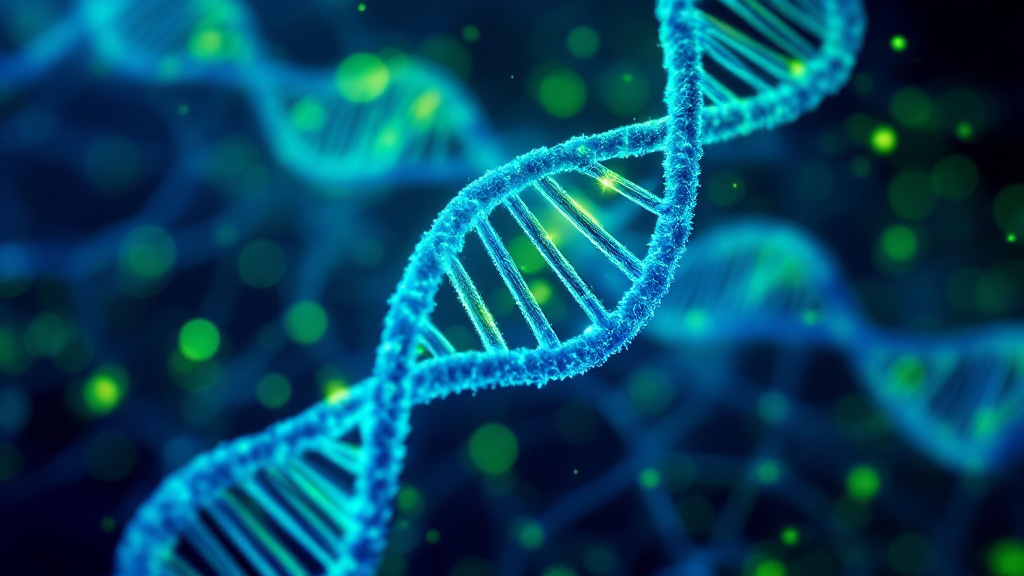
Understanding the Role of Genetics in Addiction
January 17, 2025
Decoding Genetic Influences on Addiction

The Benefits of Nature Therapy in Addiction Recovery
January 16, 2025
Harnessing Nature's Healing Power for Addiction Recovery

How to Build a Sober Social Life
January 16, 2025
Reinventing Your Social Life Beyond Alcohol

Understanding the Emotional Rollercoaster of Early Recovery
January 16, 2025
Navigating Emotions on the Path to Sobriety

Managing Anger and Emotional Outbursts in Recovery
January 15, 2025
Navigating Anger and Emotional Challenges on the Path to Recovery

Understanding the Different Levels of Care in Addiction Treatment
January 15, 2025
A Comprehensive Guide to Addiction Treatment Levels

The Role of Continuing Education in Building a New Life After Addiction
January 15, 2025
Education as a Pathway to Renewal and Empowerment

3 Things to Know Before Dating an Addict
January 14, 2025
Navigating Love with Awareness and Empathy

Explanation of Hydrocodone vs Oxycodone
January 14, 2025
Unraveling the Differences: Hydrocodone vs. Oxycodone

Chris Herren's Inspirational Talk
January 14, 2025
The Journey from Addiction to Advocacy: Chris Herren Speaks Out

Do I Have Alcoholic Parents?
January 13, 2025
Understanding How Parental Alcoholism Affects Families
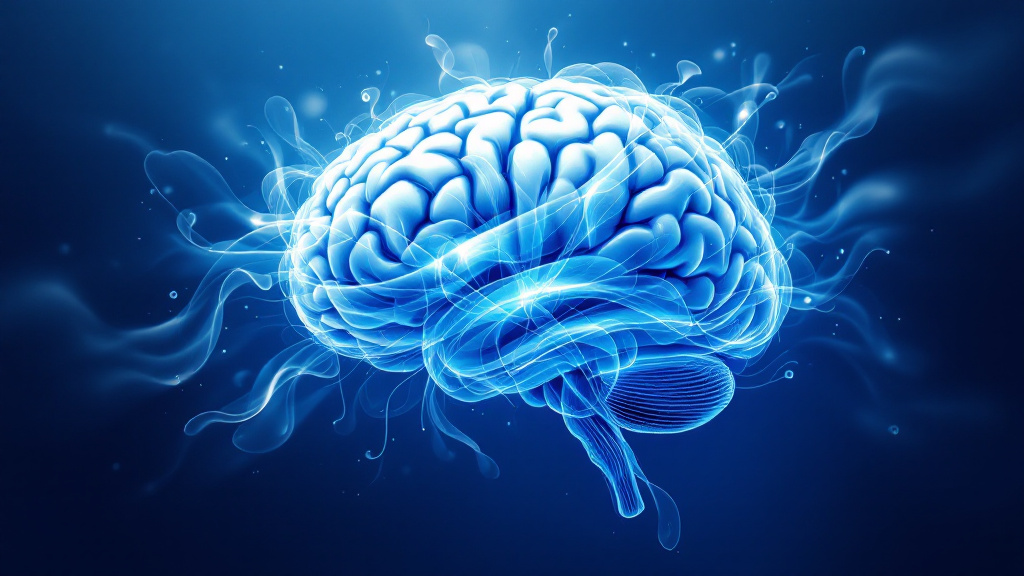
Cognitive Consequences of Methamphetamine Addiction
January 13, 2025
Unveiling the Brain's Battle with Methamphetamine

Relationships in Recovery
January 13, 2025
Navigating Interpersonal Connections on the Road to Sobriety

Weed Addiction Treatment
January 10, 2025
Understanding and Addressing Cannabis Addiction

Six Common Roles of the Family Members of Addicts
January 10, 2025
Exploring Family Dynamics in Addictive Households

Decriminalization of Drugs Decreases Addiction Rates
January 10, 2025
Exploring the Impacts of Drug Decriminalization on Addiction Trends

3 Things to Give Up in Recovery Besides Drugs and Alcohol
January 9, 2025
Beyond Substances: Key Changes for Recovery

Someone Called Me a Functioning Alcoholic
January 9, 2025
Understanding the Complexity of High-Functioning Alcoholism

How to Break Sugar Addiction Naturally
January 9, 2025
Conquer Sugar Cravings Naturally and Embrace Health

Causes of Prescription Pill Abuse
January 8, 2025
Unraveling the Epidemic of Prescription Pill Abuse

I Loved Getting High – Why Did I Change?
January 8, 2025
Exploring the Journey from Euphoria to Anxiety with Cannabis

